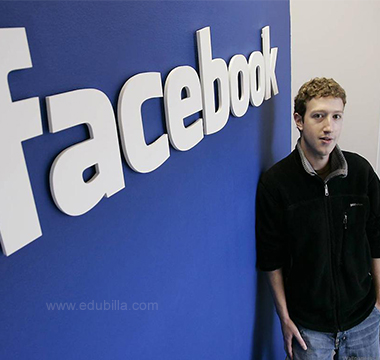Accidental Billionaire Mark Elliot Zuckerberg
November 26th, 2014 Like
An ‘accidental billionaire’ Mark Elliot Zuckerberg, popularly known as Mark Zuckerberg, is the brain behind the popular social networking site- Facebook that has the entire world hooked to it. A computer programmer and an Internet entrepreneur Zuckerberg is the chief executive and president of Facebook. In 2004, it was co-founded as a private company by him and classmates Dustin Moskovitz, Eduardo Saverin, and Chris Hughes while they were students at Harvard University
In 2010, Zuckerberg was named Time magazine's Person of the Year. As of 2011, his personal wealth was estimated to be USD 13.5 billion.
Mark Elliot Zuckerberg was born on May 14, 1984, in White Plains, New York, into a comfortable, well-educated family, and raised in the nearby village of Dobbs Ferry. His father, Edward Zuckerberg, ran a dental practice attached to the family's home. His mother, Karen, worked as a psychiatrist before the birth of the couple's four children—Mark, Randi, Donna and Arielle.
Zuckerberg developed an interest in computers at an early age; when he was about 12, he used Atari BASIC to create a messaging program he named "Zucknet." His father used the program in his dental office, so that the receptionist could inform him of a new patient without yelling across the room. The family also used Zucknet to communicate within the house. Together with his friends, he also created computer games just for fun. "I had a bunch of friends who were artists," he said. "They'd come over, draw stuff, and I'd build a game out of it."
To keep up with Mark's burgeoning interest in computers, his parents hired private computer tutor David Newman to come to the house once a week and work with Mark. Newman later told reporters that it was hard to stay ahead of the prodigy, who began taking graduate courses at nearby Mercy College around this same time.
Zuckerberg later studied at Phillips Exeter Academy, an exclusive preparatory school in New Hampshire. There he showed talent in fencing, becoming the captain of the school's team. He also excelled in literature, earning a diploma in classics. Yet Zuckerberg remained fascinated by computers, and continued to work on developing new programs. While still in high school, he created an early version of the music software Pandora, which he called Synapse. Several companies—including AOL and Microsoft—expressed an interest in buying the software, and hiring the teenager before graduation. He declined the offers.
The Rising of Facebook
About ten months before the Zuckerberg’s FaceMash epic, one of the students of Harvard – Divya Narendra – had already spoken with the idea of creating a social network exclusively for Harvard students, many of whom were suffering from emotional stiffness. And not have ‘aliens’ engaged into the network, Narendra suggested using Harvard email address as the main username.
Divya Narendra’s partners were twins Tyler and Cameron Winklevoss. The father of the Winklevoss twins, Howard Winklevoss, is a successful financial consultant and put in his sons a lot of efforts and money – so the problem with the initial capital for the future network could be solved easily.
In conversation with Mark Narendra said that the project would be called Harvard Connection (later renamed to ConnectU), and its members will be posted to the Internet their photos, personal information and useful links. The tasks of Mark Zuckerberg included programming of the site and creating a special source code, which would allow the system to work as quickly as possible.
After a private meeting with Narendra and the Winklevoss twins, Zuckerberg agreed to join in the work, but the potential of his new partners he estimated it skeptically. While working on Harvard Connection he got a fantastic idea about his own social network.
On February 04, 2004 he registered the domain name TheFacebook.com, now known throughout the world as Facebook.com. However, it functioned only within Harvard.
After Zuckerberg and his partner Eduardo Saverin realized that there were already registered 4000 users, they have come to the conclusion that they needed the services of new programmers. One of them was a Mark’s neighbor, Darren Moskowitz, who further opened the Facebook service to students at Columbia University, Stanford, and Yale.
Around the same time after the IPO, Zuckerberg owned 503.6 million shares. And now Zuckerberg controls nearly 60% of the company’s votes, 35% – Eduardo Saverin, and 5% went to newcomer Moskowitz. Another friend of Mark, Chris Hughes, was assigned as the Press attache of Facebook.
Some time later, the registration was opened to all students. The main condition was the availability of an email address in .edu zone, which also indicated a person’s belonging to education sector.
It must be said that at first this tactic worked out nicely. The project attracted audience attention of sufficient quality. When a user was trying to sign up he had to fill out a detailed profile, and in addition to the email address in .edu zone it was requested to add a real profile picture. If people used avatars instead of real pictures their profiles were deleted.
Soon Facebook went beyond the education sector, becoming more and more popular. Mark Zuckerberg started looking for investors. The first investments Mark received from one of the founders of PayPal, Peter Thiel, who is well known throughout Silicon Valley. Peter Thiel allocated $500,000 dollars and that amount was sufficient for immediate Facebook purposes. The project began to evolve rapidly. In less than a year after it was founded more than 1 million people joined the social network. For further development of Facebook they needed more investments. Accel Partners invested in Facebook $12.7 million dollars and then Greylock Partners added to this amount $27.5 million dollars.
By 2005, Facebook became accessible for all educational institutions and universities in the USA. Zuckerberg still believed that his project is a social network for students, but the interest of users to Facebook grew exponentially. Then it was decided to make a registration accessible to the public. And after this a Facebook ‘epidemic’ started.
The main thing that immediately attracted users in Facebook, is that friends who meet in real life now could communicate with each other online. It was something new.
Facebook audience grew rapidly, but the monetization of the project still remained unclear. Everyone expected that the main instrument should be context advertising. The fact is that every Facebook user fills sufficiently detailed profile, which can be used to show relevant advertisements. Obviously that would open up enough options to advertisers, who may be of interest to their audience. But Facebook continued just to build number of users. When they got over 50 million users, large companies began to offer Zuckerberg to sale them the project. So, one time even Yahoo! offered $900 million dollars for Facebook. Impressive sum, but it absolutely did not satisfy Mark. Facebook biography and Mark Zuckerberg success story is quite intriguing, isn’t it?
Lawsuits against Facebook
The Facebook project launch was accompanied by series of scandals. Six days later after launching the site senior students brothers Cameron and Tyler Winklevoss and Divya Narendra accused Mark Zuckerberg in stoling their idea. They claimed that in 2003 hired Zuckerberg to make him complete the establishment of the social network HarvardConnection.com. According to their testimonies, Zuckerberg did not provide them the results of his work, but used the original source code to create Facebook.
In the same year, Narendra and the Winklevoss twins launched their own network renamed to ConnectU. And they continued to attack on Mark Zuckerberg, complaining Harvard administration and The Harvard Crimson newspaper. Initially Zuckerberg urged journalists not to publish the investigation: he showed them what supposedly he did for HarvardConnection, and explained that those developments did not have any relation to Facebook. But very inappropriately, another Harvard student – John Thomson – in personal conversations started saying that Zuckerberg stole one of his ideas for Facebook. The newspaper decided to publish the article and it offended Mark Zuckerberg very much.
Zuckerberg took revenge on The Harvard Crimson. According to Silicon Alley Insider, in 2004, he breaks the mailboxes of two journalists from The Harvard Crimson, using the newly launched Facebook. He found users who were involved in the newspaper and browsed their logs (i.e. history) of incorrectly entered passwords in Facebook. Zuckerberg’s expectations were met: two employees of the newspaper absentmindedly tried to login Facebook with passwords from their mailboxes. Silicon Alley Insider wrote that Zuckerberg got lucky: he had a chance to read the correspondence about him between the editorial office and HarvardConnection.
The Winklevoss twins and Narendra filed a lawsuit against Mark Zuckerberg, but the court rejected their claim. They were persistent and filed another lawsuit. This time the court examined the code sources to understand whether they were actually stolen. But the truth was still not clear. The examination results were not announced. In 2009, Zuckerberg agreed to pay $45 million ($20 million in cash, and the remaining amount in Facebook shares) ConnectU as part of the court settlement. The case was closed. By that time ConnectU had less than 100,000 users, Facebook boasted about 150 million users.
The Winklevoss twins yet did not calm down and filed a petition in the U.S. Court of Appeals, but they were denied a retrial. According to their lawyer Jerome Falk, the appellate court refused to take a review of the case based only on the parties’ settlement agreement, which states that members of the trial after the signing of the document does not have the right to resume the trial. In counsel’s view, the decision was illegal, as Mark Zuckerberg in a proceeding in 2008 provided false information about the company’s value.
On May 17, 2011 Cameron and Tyler Winklevoss filed another lawsuit against the owner of Facebook Mark Zuckerberg to the U.S. Supreme Court. That was the latest attempt of the brothers to make the court to reconsider the case.
Mark Zuckerberg: TIME’s 2010 Person of the Year
In January 2010, TIME magazine named Facebook founder, CEO and 26-year old billionaire Mark Zuckerberg the Person of the Year 2010
Lady Gaga, James Cameron and founder of WikiLeaks, Julian Assange, were struggling for this title that year. However, TIME magazine chose his hero. ‘The social network created by Mark connected almost every tenth person on the planet’, – Richard Stengel, TIME editor-in-chief explained their choice. According to him, ‘Today, Facebook is the third largest country in the world that knows about its citizens as much as no government on planet does.’
According to TIME, in the past year no one else had such great impact on the world than the current winner. Mark’s popularity is so high that in 2010 David Fincher shot a movie ‘The Social Network’ in which the main role of Facebook founder was brilliantly played by Jesse Eisenberg. Previously, TIME’s ‘persons of the year’ became the United States presidents Bill Clinton and Barack Obama.
In 2010, Forbes magazine admitted Mark Zuckerberg as the youngest billionaire in its list to the state of $4 billion.
In the rating of the 400 richest people in the United States, published by Forbes magazine in 2014, Zuckerberg took 11th place with a net worth of $34 billion.
Post Your Comments for this Story


